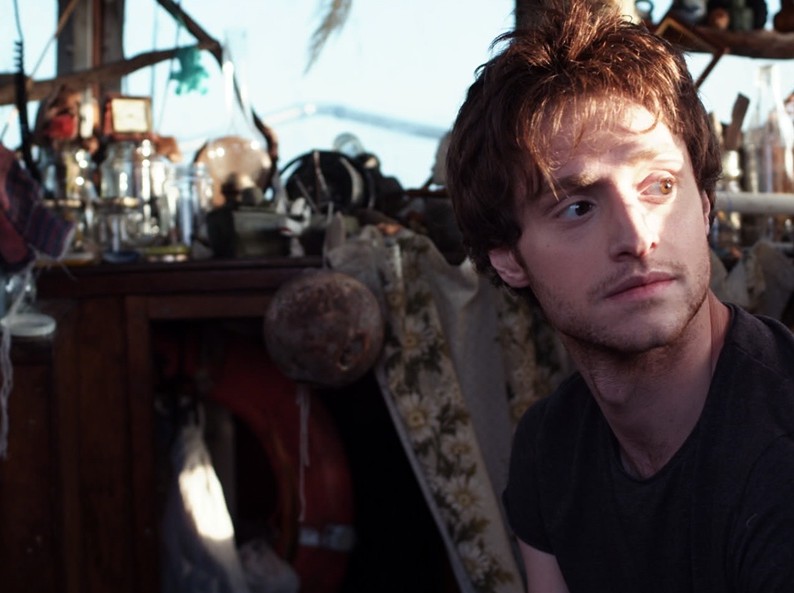 Nominated for the Audience Award at the 2013 Edinburgh International Film Festival, Blackbird is the tale of a young man facing up to the changes in his small Scottish village. As the film gains a limited distribution in Scotland, Paul F Cockburn speaks with its young leading man.
Nominated for the Audience Award at the 2013 Edinburgh International Film Festival, Blackbird is the tale of a young man facing up to the changes in his small Scottish village. As the film gains a limited distribution in Scotland, Paul F Cockburn speaks with its young leading man.
Paul F Cockburn: How would you describe the film?
Andrew Rothney: It’s a story about trying to hold onto the past, but then hopefully going into the future. What I got from Blackbird, when I was working on it, was a sense of hope… a hope for the future. Whether that is to bring stories from the past to the future, or whether it’s something else, there’s always that thought of hope. It’s not a twee, or kitsch story; it feels very much in the present. It’s about what you take with you, and what you leave behind.
Would you say your character was a bit of a Peter Pan figure, being forced to leave Neverland?
There’s a comparison in the film where Ruadhan (pronounced: “Rowan”) is talking about one of the past generation, ‘Old John’, and how he took everything in–he never forgot, and then he went mad. I think there was a real fear on Ruadhan’s part that if he doesn’t do this, he will go mad. I agree there’s a sense of him never wanting to grow up, and he feels that he has to collect everything he can. There’s a desperation when he sees it all slipping away; he feels that no one is going to take the responsibility. He’s trying to fight change, and it’s near impossible. He’s missing the point. He’s so wrapped up in his romanticism that he forgets he has to look after himself and the people around him.
How did you get involved in the film?
I just replied to an email going around my drama school (RSAMD, now the Royal Conservatoire of Scotland) asking for auditions. Still being at drama school at the time, I did it to get some showreel material. I came in auditioning for the part of Callum, because Ruadhan… I saw the blurb for him and couldn’t wrap my head around it. But because I couldn’t find the audition room and I’d got in contact with the wrong people, I came to the audition pretty annoyed and flustered. Funnily enough, we did a scene–which I don’t think is in the film now–where Ruadhan is very flustered and angry. I think that must have swung it for me!
Was it daunting being the lead actor in your first feature?
A year before this I’d worked on a drama documentary about the King James Bible, with Norman Stone. A great learning curve because, though I’d done short films and such like, that was a professional shoot and I was in it quite a lot. Even though drama documentary is a slightly different beast, that gave me an invaluable insight into working on Backbird. As more or less the lead, there comes a certain responsibility to the story; it sort of rests on the shoulders a bit, but you accept that and let it go, because you can’t think about it. All you can do is serve the story, tell it the best you can, and everything else is superfluous; as long as you serve the story and do it the justice it deserves, that’s all I concerned myself with.
What do you hope audiences will take away from watching Blackbird?
I just hope that they enjoy what we have to say. I think it’s quite a unique film, in as far as it’s made in Scotland, and shows a unique part of the landscape which often doesn’t get a lot of a look in. And it deals with a lot of issues and presents them in quite a modern way, whilst dealing with things that might come across as quite kitsch and maybe “short-bread tin”, but keeping it really up-to-date and relevant.
At the core of the film are the traditional folk songs performed by Norman Maclean, Margaret Bennett and Sheila Stewart. Were you familiar with this kind of music?
I had been aware of it, but my knowledge wasn’t great. In preparation, I’d researched people like Norman, Margaret and Sheila, and listened to some of Norman’s stories. I’d downloaded a few albums–especially (the late) Martyn Bennett’s that I still listen to now. Over the course of the film, working on it, I became quite immersed to that style, and fell in love with it, because it’s beautiful and it feels very much a part of the people and the landscape. The landscape seems to be personified through the music, and I feel that I’ve taken on something that I can pass on to other people. It wasn’t just about working on a film; I felt a bit of a responsibility for myself, not just my character, to get all I could from Norman, Margaret and Sheila… to take what they’ve given me and tell the tale to someone in passing. It doesn’t have to be a grand thing; any oral tradition is about just passing it on.
First published by Reel Scotland (29/11/2013); you can read it here.